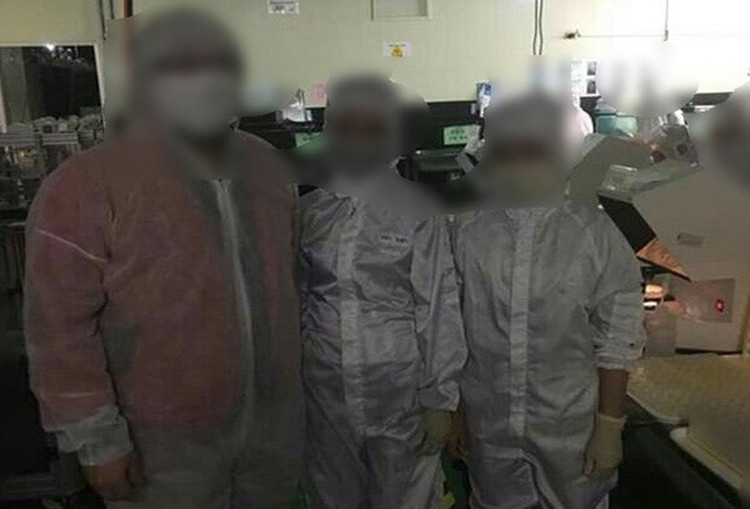Popular Reads
Top Results
Can't find what you're looking for?
View all search resultsPopular Reads
Top Results
Can't find what you're looking for?
View all search resultsCOVID-19 must not blind us to exploitation of workers
Change text size
Gift Premium Articles
to Anyone
T
he demands of COVID -19 are placing a strain on the workforce at the bottom of global manufacturing supply chains, often crucial to the pandemic response.
Most recently, the plight of the vulnerable workers underpinning the world’s COVID-19 response has been brought back into the public discussion after United States Customs and Border Protection (USCBP) imposed a detention order on products from Malaysian medical glove manufacturer Top Glove.
USCBP told ABC News that the decision was, “based upon reasonable evidence of forced labor in the manufacturing process,”.
This should come as no surprise to anyone familiar with the company, which was the subject of an investigation by The Guardian that revealed widespread exploitation of workers in its Malaysian factories.
The International Labor Organization (ILO), the data of which was used by USCBP to justify the import ban, estimates that 24.9 million people are forced into labor situations worldwide.
Forced labor situations like the " COVID-19 Heroes" scheme by Top Glove, which saw workers work seven days a week on a “voluntary base” under the auspices of being a "hero" in the fight against COVID-19.
The rhetoric surrounding the scheme, which was implemented to skirt labor laws, is sickening enough, the workers making the gloves and masks that protect us from spreading COVID-19 deserve better.
The sharp decrease in demand for certain sectors of manufacturing has resulted in the drying up of available work, meaning millions of factory workers have either been laid off or placed on temporary leave. This creates an environment ripe for potential exploitation as workers are forced into work due to a fear of losing income, or a need to cover gaps left by a reduced workforce.
Those returning to work often come back to factories where physical distancing is not enforced and inadequate hygiene standards are in place. Garment workers in Bangladesh have reportedly had to go on strike for hand washing stations and face masks, a bare minimum for effective disease prevention.
Migrant workers make up a large part of these workforces and are at a greater risk for exposure due to living circumstances. Often migrant workers live in dormitories or cramped housing, with kitchens, toilets and beds often shared by many people.
Much research has been conducted into the effect these living conditions have on the spread of COVID-19. In Singapore, a second wave of cases has been attributed to the spreading of COVID-19 among migrant workers. When Singapore announced 3,000 new cases in April, it was found that 80 percent were linked to migrant worker dormitories.
The pandemic has exposed the parts of modern society that we need to focus more attention on. The living circumstances of migrant and poorer workers is something that is not sustainable going into an uncertain future.
Neglecting protections for those at the bottom end of supply chains undermines the global pandemic response.
There needs to be a concerted effort from those who buy the goods, the suppliers and producers, and the workers, to address the issue of forced labor. Groups from every level of the supply chain should work together to provide a safer and more dignified working environment.
What we are seeing in the case of Top Glove is a dismissal of the flaws ingrained in the system. In a statement to the media, Top Glove’s CEO blamed activists and foreign media with an agenda on the import ban.
From this response it's clear to see that Top Glove wishes to wash its hands clean of any responsibility for workplace practices that its industry has become unfortunately notorious for.
It still remains to be seen the exact reasoning behind the export ban, or what processes Top Glove is enacting to fully stamp out these instances of exploitation. The manufacturer seems to be playing ball with labor organizations and hopefully this leads to improvements in worker’s welfare.
While the fight against COVID-19 is far from over, we must start thinking about what we want the world to look like in its aftermath.
Right now the world is in urgent need of more face masks, gloves, and protective gowns to stock the fight against the pandemic. Those who make those supplies should not be subject to insecure work situations, or worse still, be actively exposed to the virus they are working to protect the world from.
The urgency to stamp out the spread of COVID-19 makes the potential entrenchment of unethical practices a reality. Alternatively, the pandemic provides an opportunity to come together as a global community and show that an effective response does not need to be separate from better treatment of our most vulnerable.
***
The writer is a Melbourne-based freelance journalist with work published in various media organizations, both international and domestic.










